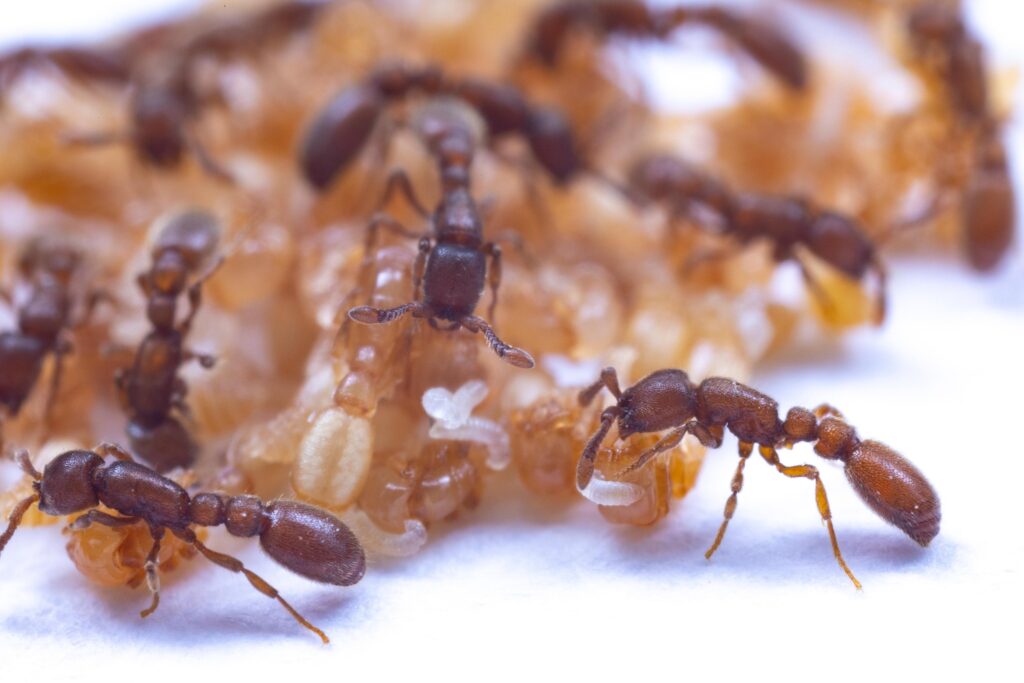Ant eggs hatch to form larvae that pupate before they emerge as adults. Entomologists have assumed that the pupae interact not with the colony, but with one study, which was published in the journal Nature, shows that this is not the case. Daniel Kronauer and colleagues revealed that ant pupae produce a substance similar to a substance milk which is consumed by other ants and improves colony fitness. The study has important implications for our understanding of how insect societies evolved and regulated.
To systematically analyze the different stages of the animals’ development, the research team removed specimens at different points in life, examining how social isolation might affect the insects. Shortly before hatching, the pupae secrete large quantities of a nutrient-rich substance, similar to mammalian milk, which is directly consumed by the adult ants or the developing larvae, which are placed on the pupae by the adults. Behavior plays a vital role in the survival of the colony. Larvae that cannot access the secretion show stunted growth and poor survival, while pupae left in stasis in their secretion develop fungal infections and die.
“The first days after hatching – notes Kronauer, a professor at Rockefeller University – The larvae depend on this substance in a manner similar to what happens to mammalian babies with milk. Adults also drink it voraciously, and although its function on adult ants is not clear, we speculate that it plays a role in metabolism and physiology.This particular fluid arises from the process of moulting, which all insects share, but while the non-social species reuse the resulting nutrients, the ants share the beneficial materials with the rest of the colony. The fluid also contains hormones and psychoactive substances, so can It affects the behavior and functions of colony members.
This behavior had not been observed previously because the scientists focused on ant colonies rather than individuals. In the colony, the pupa’s secretions never accumulate because it is quickly consumed, so the fluid only appeared when the authors studied isolated pupae.
This form of social interaction was actually unknown before, but it appears essential to the health of the colony. “The way animals behave in relation to this fluid – Kronauer says – It creates a dependency between the different stages of developmentAfter preliminary analyzes of Ooceraea biroi, the researchers found the same phenomenon in each of the five known subfamilies of ants.”We assume this privacy – Kronauer comments again – It evolved early in the evolutionary path of ants or even earlier. Colonies of ants are sometimes seen as superorganisms, unified entities made up of many individuals working in concert, exchanging and transmitting chemical signals and pheromones.
“Virgo Liquid – adds Orly Snir, colleague and Kronauer co-author – It represents the driving force behind a hitherto overlooked central interaction network in ant societies. Our work shows a new aspect of dependency links between larvae, pupae, and adultsIn the next steps, the team aims to explore the effects of this substance on the internal functioning of the colony.Our goal is long term – the authors concluded – is to gain a deep understanding of the neural and molecular mechanisms that govern social organization and the way in which it has evolved.”
The research also gives weight to an old theory that posits a link between the evolution of ant eusociality and the interdependence of feeding among colony members. “This feeding theory fell by the wayside in the late 20th century, as explanations of social evolution in ants and other social insects, presented through the lens of population genetics, came to light.Patrizia Dettori and Kazuki Tsuji say in an accompanying article for News & Views,However, the theory of nutrition is regaining ground in this century.they add.

“Infuriatingly humble social media buff. Twitter advocate. Writer. Internet nerd.”



